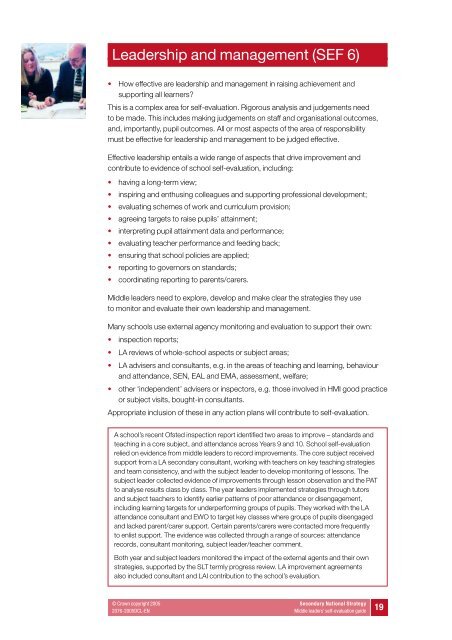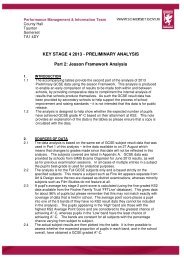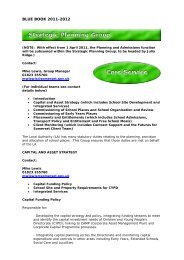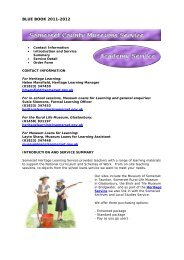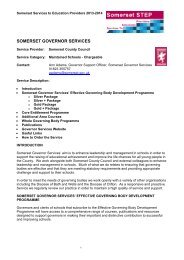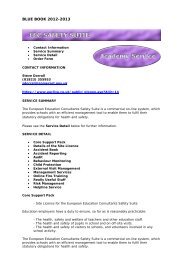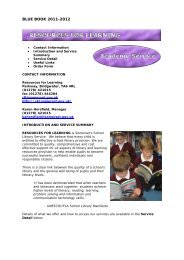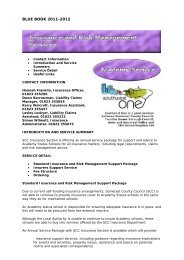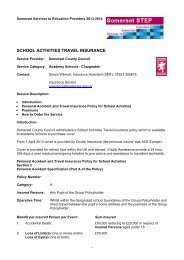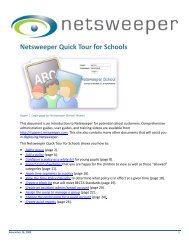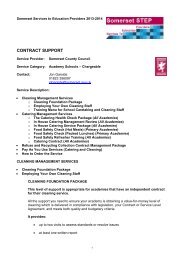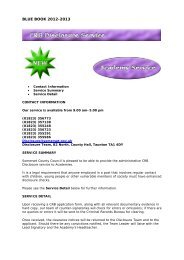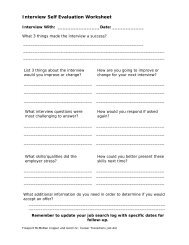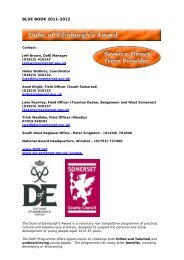Middle leaders' self-evaluation guide
Middle leaders' self-evaluation guide
Middle leaders' self-evaluation guide
Create successful ePaper yourself
Turn your PDF publications into a flip-book with our unique Google optimized e-Paper software.
Leadership and management (SEF 6)<br />
• How effective are leadership and management in raising achievement and<br />
supporting all learners?<br />
This is a complex area for <strong>self</strong>-<strong>evaluation</strong>. Rigorous analysis and judgements need<br />
to be made. This includes making judgements on staff and organisational outcomes,<br />
and, importantly, pupil outcomes. All or most aspects of the area of responsibility<br />
must be effective for leadership and management to be judged effective.<br />
Effective leadership entails a wide range of aspects that drive improvement and<br />
contribute to evidence of school <strong>self</strong>-<strong>evaluation</strong>, including:<br />
• having a long-term view;<br />
• inspiring and enthusing colleagues and supporting professional development;<br />
• evaluating schemes of work and curriculum provision;<br />
• agreeing targets to raise pupils’ attainment;<br />
• interpreting pupil attainment data and performance;<br />
• evaluating teacher performance and feeding back;<br />
• ensuring that school policies are applied;<br />
• reporting to governors on standards;<br />
• coordinating reporting to parents/carers.<br />
<strong>Middle</strong> leaders need to explore, develop and make clear the strategies they use<br />
to monitor and evaluate their own leadership and management.<br />
Many schools use external agency monitoring and <strong>evaluation</strong> to support their own:<br />
• inspection reports;<br />
• LA reviews of whole-school aspects or subject areas;<br />
• LA advisers and consultants, e.g. in the areas of teaching and learning, behaviour<br />
and attendance, SEN, EAL and EMA, assessment, welfare;<br />
• other ‘independent’ advisers or inspectors, e.g. those involved in HMI good practice<br />
or subject visits, bought-in consultants.<br />
Appropriate inclusion of these in any action plans will contribute to <strong>self</strong>-<strong>evaluation</strong>.<br />
A school’s recent Ofsted inspection report identified two areas to improve – standards and<br />
teaching in a core subject, and attendance across Years 9 and 10. School <strong>self</strong>-<strong>evaluation</strong><br />
relied on evidence from middle leaders to record improvements. The core subject received<br />
support from a LA secondary consultant, working with teachers on key teaching strategies<br />
and team consistency, and with the subject leader to develop monitoring of lessons. The<br />
subject leader collected evidence of improvements through lesson observation and the PAT<br />
to analyse results class by class. The year leaders implemented strategies through tutors<br />
and subject teachers to identify earlier patterns of poor attendance or disengagement,<br />
including learning targets for underperforming groups of pupils. They worked with the LA<br />
attendance consultant and EWO to target key classes where groups of pupils disengaged<br />
and lacked parent/carer support. Certain parents/carers were contacted more frequently<br />
to enlist support. The evidence was collected through a range of sources: attendance<br />
records, consultant monitoring, subject leader/teacher comment.<br />
Both year and subject leaders monitored the impact of the external agents and their own<br />
strategies, supported by the SLT termly progress review. LA improvement agreements<br />
also included consultant and LAI contribution to the school’s <strong>evaluation</strong>.<br />
© Crown copyright 2005 Secondary National Strategy<br />
2076-2005DCL-EN <strong>Middle</strong> leaders’ <strong>self</strong>-<strong>evaluation</strong> <strong>guide</strong> 19


